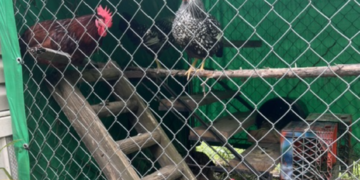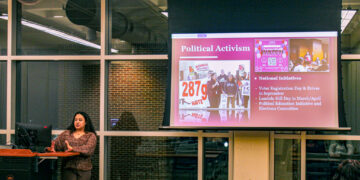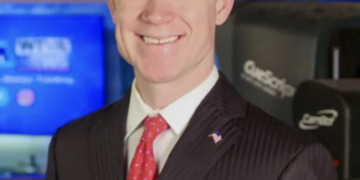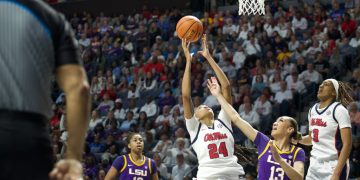After students brought concerns to the theatre department regarding a workshop with a controversial alumnus, faculty was quick to cancel the event altogether and create a committee that handles donors and guests. Despite being grateful for the cancellation, some students who were invited are still asking why it was scheduled in the first place.
What was the reason that administrators planned for a group of majority female students to meet with an alumnus who had been exposed for sharing emails with misogynistic language? Some say money, and evidently, the alumnus himself was told a false reason for the event cancellation.
In February, one student reached out to The Daily Mississippian with concerns about why Sam Haskell was invited to speak and said others close to the situation felt the same way. The Daily Mississippian filed a public records request to obtain emails from faculty members regarding how the decision was made.
Evident in the records, concerns about Haskell’s reputation were brought up early in discussions about the workshop, in the form of jokes and serious discussion, but it wasn’t until a student brought up his or her own problems with meeting Haskell that faculty members involved in planning the workshop became more concerned.
In 2017, Haskell exchanged email correspondence that fat-shamed and slut-shamed former Miss Americas. He called them misogynistic slurs, and in one case, he joked at the suggestion that one of the women should die. After these emails were highly publicized, Haskell called them “a mistake of words” and stepped down as CEO of the Miss America Corporation.
A Mississippi native, Haskell is often revered for his role in entertainment; he has produced several films with Dolly Parton and has worked with celebrities including Bill Cosby, George Clooney and Sela Ward. Starting in the mailroom at William Morris Agency and climbing to Worldwide Head of Television, he has since become a rags-to-riches story in his hometown of Amory, where the local high school sits at 1006 Sam Haskell Circle.
Haskell, who is also a heavily involved member of UM’s club of wealthy donors, has a star-studded resume that would — in any other case — excite students at the chance to work with him. However, after a quick Google search, students in the theatre department, most of them women, were uncomfortable with meeting him.
On Jan. 21, students who are receiving a bachelor of fine arts degree in the department received an email about a free Zoom workshop with Haskell. For some students, the class was required, and it was set to begin at 9 a.m. on Jan. 30.
However, after “Rebecca,” a student in the theatre department who asked to be anonymous because of Haskell’s connections in the entertainment industry, researched him, she and her classmates instantly opposed the workshop.
“We were like, ‘Hey, we just don’t think this is like a great idea. Like, it really just leaves like a bad taste in my mouth, and I think people are just going to be really hesitant to learn from him,’” she said.
Talks about scheduling the workshop began with associate director of development Rob Jolly on Nov. 18, and shortly after, Jan. 30 was chosen as the date of the Zoom meeting.
On Dec. 7, associate professor Alan Arivee sent an email to associate professor Michael Barnett that contained the first acknowledgement of Haskell’s past. Arivee brought up Haskell’s email scandal again on Jan. 21, the same day that the workshop was announced to students. In this exchange, he sent similar messages to Barnett and associate professor Rory Ledbetter on separate threads and inquired about whether or not money is the reason for scheduling the event.
He wrote, “All joking aside, I do still have concerns about promoting Sam Haskell to students. The emails that he sent in relation to the Miss America pageant, initially published by the Huffington Post have certainly not been forgotten by the industry, despite his ability to continue producing. He resigned as CEO of the Miss America Organization over it. I will not mention this to my students, but I would certainly understand if one or two decided not to take part because of that scandal. Is it possible we’re hoping he’ll give the department money?
“Okay, I don’t mean to be negative, but I had to plainly bring all this up. That was in 2017, not too long ago. My own personal opinion is that Sam Haskell is pretty despicable. I don’t want to get in the way of any plans to use his considerable fortune to promote the good we’re doing, however.”
In response, Barnett said he would be happy to find a time to discuss Arivee’s concerns in the future. Arivee did not respond to a request for comment.
Just five days after the department sent its initial email announcing the workshop, the first student reached out to Ledbetter with concerns about meeting with Haskell. Ledbetter also did not respond to a request for comment at the time of publication.
“I assume you guys didn’t see any of (the controversial language Haskell and his colleagues had made), but I just wanted to let you know some of us are uncomfortable with hearing from him, especially when our department is mostly women,” one student, whose name was redacted, sent to Ledbetter on Jan. 26.
In one response to a student, whose name was also redacted, Ledbetter writes that the department had no part in initiating talks with Haskell and that it was assumed that the workshop was created in order to bring in money for the theatre department.
“When the UM Foundation approached us about having a workshop with Sam in the hopes of nudging him to build a scholarship fund for students and potentially contribute to a new theatre building, we decided that a workshop wouldn’t hurt anything and it may be useful for everyone to hear about the industry from someone who had been a high-profile agent,” Ledbetter replied.
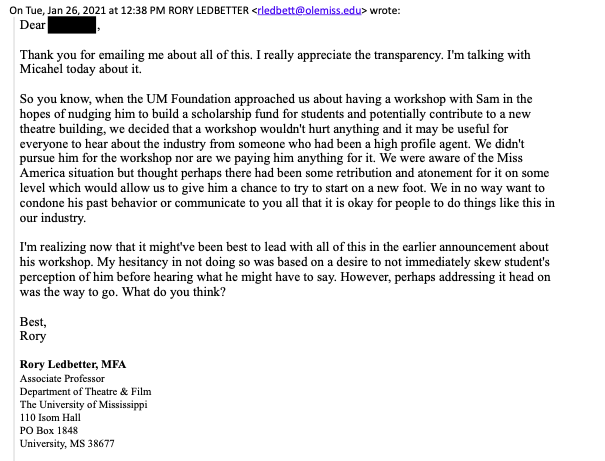
Ledbetter also said that those involved in planning the event were aware of the “Miss America situation” and thought there had been enough atonement on Haskell’s part for the department to reach out. He added that the department in no way condones Haskell’s behavior.
“My hesitancy in (not leading with Haskell’s controversial past) was based on a desire to not immediately skew students’ perception of him before hearing what he might have to say,” Ledbetter wrote.
Shortly after students sent complaints regarding the workshop to faculty and administrators, the department held a town hall with faculty and students at 5 p.m. on Jan. 27 to listen to concerns about Haskell’s involvement in the theatre program. By 7:27 p.m. on the same night, the workshop was canceled due to the amount of concerns presented at that meeting.
In a statement to The Daily Mississippian, Barnett said that he and other departmental colleagues invited Haskell to provide educational knowledge of the entertainment industry.
“In January 2021 when I was contacted by students in the department expressing concerns regarding the event, a listening session was scheduled to provide a forum for them to share their perspectives with members of the faculty and me. Based on the feedback that was shared, I quickly moved to cancel the workshop,” he said. “In response to these events, a group of faculty in the Department of Theatre & Film is currently working to establish guidelines to help steer the process by which presenters are identified. In the fall, a committee made up of departmental faculty, staff and students will be convened which will serve to advise on the selection of guest artists and speakers in an effort to ensure that a collection of representative voices are included in the process from the outset.”
Barnett also said that the department aims to provide an environment where students can share their viewpoints.
However, Jolly, who was the main correspondent in arranging the workshop, told Haskell a different story.
Jolly told Haskell that the workshop was canceled because most of the students had contracted COVID-19, not because they were upset with hosting Haskell.
“Michael Barnett contacted me this evening about Saturday’s workshop. Unfortunately, he communicated that many students planning to participate in Saturday’s ZOOM are presently ill with COVID,” Jolly wrote. “Apparently, the virus is impacting the students in Michael’s department at a high rate. Although the affected students can still participate in the workshop remotely, Michael’s fear is that many will simply be too sick to actively participate and really engage with you.”
Jolly then asked Haskell to potentially reschedule the workshop to take place during the fall 2021 semester. He then reached out to Barnett, writing that “all is good,” and that the workshop would be rescheduled. Jolly did not respond to a request for comment.
“I think the question was more like, why is the university attaching our name to him and why are we accepting his money?” Rebecca said. “I understand that money is an important part of running a university, but then when you look at the Creed, Sam Haskell as an alumni does not follow the terms of the Creed. If we’re going to stick to that, we should uphold that to our alumni, too.”
Like Rebecca, “Ashley” is another student in the theatre department who asked to be anonymous. She believes canceling the masterclass was the right decision, but the idea that the class would occur in the first place was shocking to her.
“The fact that the department was considering it was very hurtful,” she said. “Yes, I guess you can change your ways; maybe you can be a better person, but I’m a woman. I’m going to be working in the theatre industry and in the art industry. There are so many issues with men treating women with a lot of disrespect and sexual misconduct. The situation with him, to me, minimizes the issue of white men being in management positions and not treating women equally.”
The workshop also came with the possibility of scholarships given to the theatre program. For what one student called a “struggling” department, money for students would have been a great opportunity. To some students, the department was in a “tough spot” in choosing whether or not to forego potential money for students. In the end, students said, the faculty chose to side with its students.
“I remember thinking if I ever owned a theatre company, or if I ever worked for one, would I accept money from someone like him? The answer is just no,” Ashley said. “I want to uplift women. That is not what he stands for, and so that was very unsettling.”
Still, the Gertrude C. Ford Center’s main theatre — where students have had many performances — bears his name, a fact that students in the theatre department call “very uncomfortable.”
“The question that we brought up is if (Haskell’s email scandal) happened today in 2020, would that situation be different than when it happened in 2017?” Ashley said. “There are a lot of donors that are problematic at the university, and I totally understand that. People always talk about how hard it is for (progress) to happen because of donors and what donors want.”




